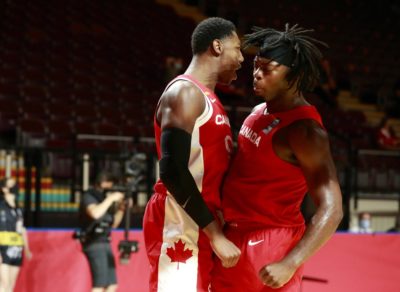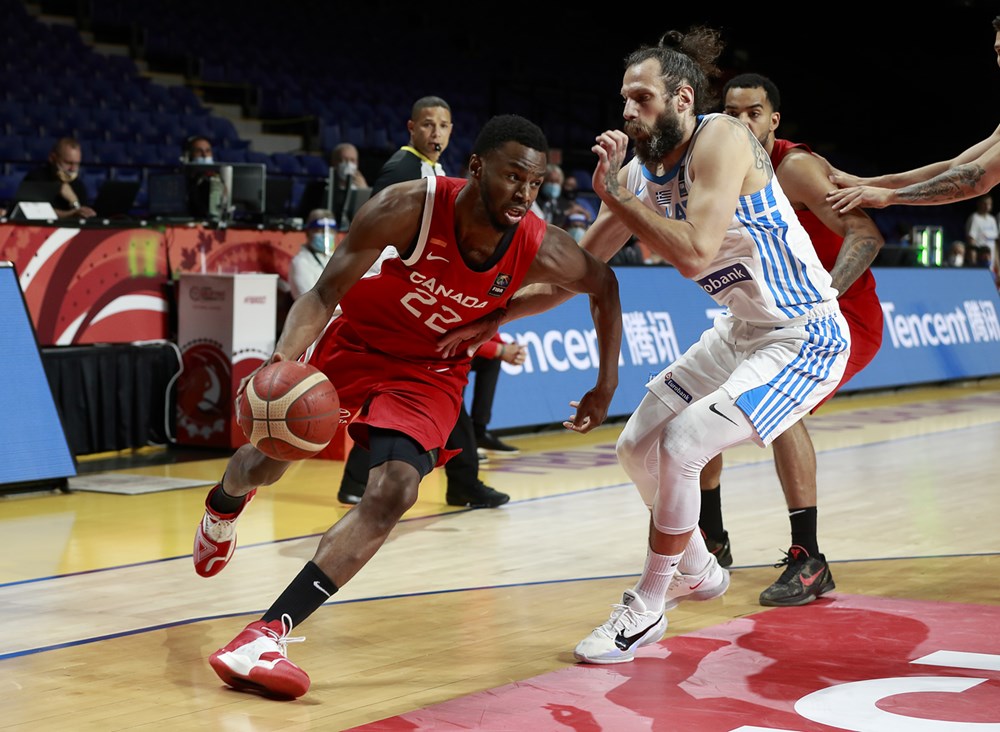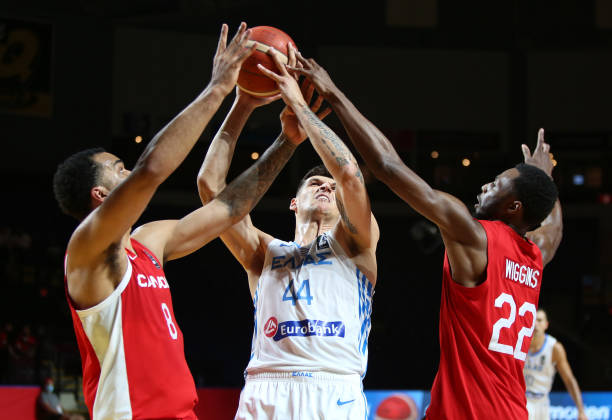VICTORIA, B.C. – Andrew Wiggins was the best player on the floor in Canada’s 97-91 win over Greece in the opening match of the FIBA Olympic qualifying tournament. There is no doubt about that. Wiggins finished the game with 23 points including 3 made three-pointers along with 6 rebounds and 2 assists. He also had the two biggest buckets of the game, spinning into a fadeaway jumper at the right elbow and then hitting another mid-range jumper, both in the final two minutes of the game, to take Canada home.
But Canada didn’t defeat Greece because of Wiggins. As good as he was, the offense was never a problem in this game, as Team Canada put up 46 points on 55 percent shooting in the first half despite both Wiggins and RJ Barrett struggling, going a combined 4/11. It was actually Nickeil Alexander-Walker lighting it up in the first half, shooting 5/7 for 14 points in the half. And it will likely be that way the rest of the tournament, with somebody stepping up when they need buckets because Canada is too talented and has too many good scorers and floor-spacers to struggle offensively for too long, especially against a team like Greece who, despite having a ton of institutional knowledge, isn’t the most strong or athletic team in the tournament.
Canada won this game with defense, overcoming a 4-point halftime deficit that included Greece shooting 8-18 on mostly wide open threes by changing their defensive scheme in the second half, limiting Greece to just 2 made three-pointers in the half, including 0 in the third quarter.
The big change Canada made was that, after a bunch of defensive breakdowns in their pick-and-roll coverage led to Greece getting anything they wanted, they simplified their defense by switching 1-through-5 to begin the second half. It was a change that takes full advantage of the rosters’ versatility and wealth of wings, and it worked so well that they stuck with it for the entire half, no matter who was on the floor, allowing just 41 points in the second half. The switching also fueled their offense, helping Canada get five steals and 10 fast break points in the half.
As Alexander-Walker put it, “We’re capable of scoring and we have length, guys that can guard one through five and we switched it up in the second half, and it turned in our favour. Got us out of rotation a bit more, cut out the threes and we were able to be ourselves.”
Of course, some of the defensive breakdowns in the first half were not due to scheme at all. Team Canada didn’t play any exhibition games in the lead-up to this tournament, so they were rusty to start the game. It showed up on both sides of the ball, with 6 turnovers and just 7 fast-break points in the first half. But chasing ball-handlers over screens and asking the help-defenders to pinch into the paint — which is necessary to take away drives with Canada’s lack of rim-protection — was simply too much for this newly assembled Canadian team. The switching left them susceptible to post-ups and offensive rebounds on mismatches, but the fought really well as a team to overcome those potential issues, not only playing harder in the second half, but also communicating better and being more active on the ball.
“I think first and foremost for us we knew it was going to be a big learning experience and our first game together with this team against a very very good team,” Nick Nurse said after the game. “We saw their rhythm, experience, execution on display at a high level. I thought we did well to hang in there for the first half because they were playing very well and shooting very well. Guys did a great job of hanging in, making this some adjustments.”
In terms of what they learned, Nurse said that he knew that they could be versatile, but saw even more opportunities to be versatile against Greece, and it’s likely that the switching had a lot to do with that.
“I thought we were pretty good defensive half the second half,” Nurse said. “So, again being versatile on defense means you can change schemes and change matchups and execute them. We didn’t, being honest, we didn’t execute some of our schemes very well in the first half.”
Greece head coach Rick Pitino admitted that the switching caught his team a little off guard, saying, “That’s what pro basketball has become. When you have the mismatch, the mistake is to look for it on the first pass. And we did it two times. Instead of moving the ball and the second pass comes from a high-low — that’s how you hurt switching defence. When you look for it off of once pass, you play into the hands of the defence that knows how to help. We’ll make that adjustment next game.”
Part of that what made the switching work so well was a front-court combination the Nurse came upon in the second half: Lu Dort and Dwight Powell. Both had good individual games, but it was when they were together that Canada looked best, combining the perfect mix of size, strength, speed and athleticism to allow Canada to execute on their switching scheme. Powell can switch onto the perimeter against most guards, and Dort can guard most bigs. That, and their ability to rotate and help their teammates, allowed Canada to outscore Greece by 7 with the two of them in the game, with most of their minutes coming in the second half. In fact, it was Dort who pinched down low and came up with a steal at the end of the game, leading to a transition bucket.
“You saw there at the end, that big stop for us at the end. That’s really what he does,” Barrett said about his teammate. “All game long, he brings the energy, he plays defence. He’s running in transition. He’s moving the ball. He’s definitely a key guy for us and someone you can always count on.”

FIBA / Editorial use only
Again, Wiggins was great, especially in the second half, when his shot-making came up clutch and ultimately decided the game. I don’t want to gloss over that, because the fact that Wiggins is even playing for team Canada is surprising, and the fact that he made such a big statement in the opening game is important for their Olympic hopes.
But Team Canada got back into this game with their defense, switching everything and using their versatility to their advantage. They likely want to be able to play multiple ways defensively and to switch it up unexpectedly. But knowing that they have the ability to switch in their back pocket — and learning about what they have in a Dort/Powell frontcourt — has to feel good. Nurse always wanted this team to have a defensive identity, and it looks like they found something in the second half against Greece.



